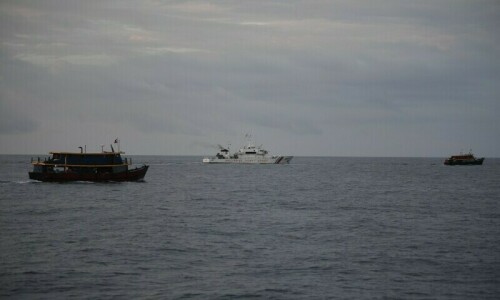RELATIONS between Pakistan and Iran stand at a very delicate juncture after the latter struck targets inside Pakistani territory on Tuesday.
While Tehran has claimed it hit “strongholds” of the Jaish al-Adl terrorist group in the air strikes, Pakistan says two minors had lost their lives in the Panjgur attack.
On Monday, Iran had carried out similar strikes inside Iraq and Syria, hitting what it said were “spy headquarters” and “terrorist” bases in these states. The Foreign Office has reacted with a sternly worded statement, condemning this unjustifiable violation of Pakistani sovereignty and warning of “serious consequences”.
Indeed, the attack, as it said, is “completely unacceptable” — and Tehran should take note. The situation is deteriorating rapidly, as on Wednesday Pakistan recalled its ambassador from Tehran and suspended all high-level bilateral visits. The Iranian envoy in Pakistan, currently in his home country, will also not be allowed to return to Islamabad.
The violation of Pakistani territory is totally indefensible; such unilateral actions — especially resulting in the loss of innocent lives — may do irreparable harm to bilateral ties.
The activity of militant groups on both sides of the border is one of the biggest irritants in the bilateral relationship, and Pakistan and Iran need to address this issue in a mature fashion to ensure the situation does not worsen further.
There were several terrorist attacks last year, with the last major incident occurring in December 2023, in which 11 Iranian law enforcers were killed in an ambush on a police station.
Iranian officials had claimed the assailants entered from Pakistan. Meanwhile there were also two attacks last year, apparently originating from Iran, in which several Pakistani troops were martyred.
Border security, particularly the elimination of safe spaces for terrorist groups, is an area both states must work on jointly, instead of pursuing unilateral actions. The immediate need is to prevent a rupture in ties. China, which enjoys cordial relations with both states, and has urged “both sides to exercise restraint”, can perhaps use its good offices to help resolve this sensitive matter.
Meanwhile, it is also true that various foreign actors would like to see a permanent break in Pakistan-Iran ties; the capitals of both countries must, therefore, prevent an escalation and work to restore calm.
After matters have cooled down, the mechanism that exists for border security management should be actively used to target militants threatening either state’s security through joint operations.
Under no circumstances should either state’s sovereignty be violated through unilateral actions. The Iranian authorities must particularly work to prevent a repeat of such attacks.
At a time when the fires of conflict threaten to consume the region, both sides must act with restraint and statesmanship to prevent this crisis from growing.
Published in Dawn, January 18th, 2024














































Dear visitor, the comments section is undergoing an overhaul and will return soon.